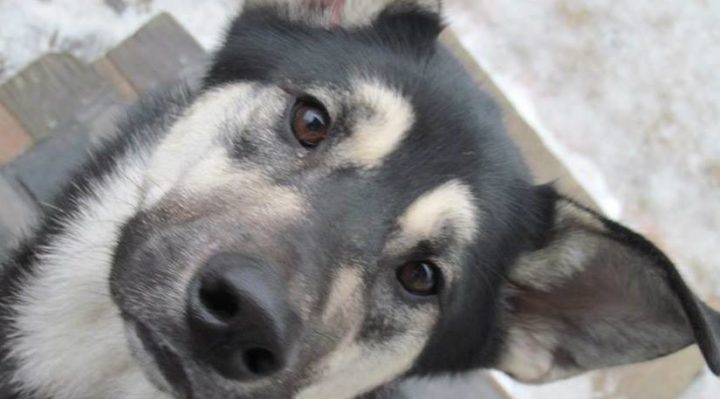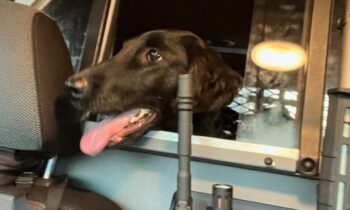
Dogs aren’t easy. You can’t explain things to them. No matter how long the lecture, no matter how many words, a dog is still hearing, as in that famous Gary Larson cartoon, “Blah Blah GINGER.” You can’t get mad at a dog for that—it is what it is. Dogs don’t understand English or any other language.
Try this simple exercise: write a list of the words your dog recognizes.
I say “recognizes” because you probably don’t know if your dog actually understands these words. You know he recognizes a word because, when you say it in a certain way, your dog looks up, stands up, reacts. Your dog shows interest. Your dog pays attention for what is coming next.
Is “treat” one of the words? Most likely, a word like “treat” (or “cookie” or “biscuit”) is on your list. Not surprising—the word predicts something good for the dog. He has positive associations with that sound, said in that way. He “knows” that your treat word means something yummy to eat. Your dog has learned the “meaning” of that word through many repetitions over time of your saying, “Want a treat?” with a treat following immediately for the dog. Immediate reward, repeated over time—bingo!
My dogs’ list would include “dinner” as another word predicting good things (one of the best rewards of the day). True, the reward isn’t always immediate. I might say, “Dinner!” in the upstairs hall as I start downstairs to fill the bowls. But my dogs know the drill, because it has been repeated so many times with a predictable reward. They hear the word and I move toward the kitchen, get the food, put the food in their bowls. Not an immediate reward, but certainly an immediate beginning to a short process that results in the reward. “Dinner” means a meal!

Dogs learn the names of objects in much the same way. What do you call the toy you throw? Is it “ball”? What reaction do you get from your dog who loves to chase and fetch a tennis ball when you say the word you use for that ball? Eager attention, physical excitement, even an actual search for the object to bring it to you so you can start the game? Yup, your dog recognizes that word!
But what if you had never called the ball a ball? What if you had always called it, I don’t know . . . “meatloaf”? Then your dog would probably react with great enthusiasm when you said “meatloaf”! Your dog would probably run around looking for that tennis ball—er, meatloaf—because “meatloaf” predicts that the game of fetch is afoot.
But if someone else wanted your dog to play fetch and said to your dog, “Ball!”—your dog who had never before heard that word associated with the round yellow object with which you play fetch—well, your dog who plays fetch with a “meatloaf” might just stand there and stare. “Ball” would have no meaning for that dog, no context in which to get excited, no clue as to what was coming next.
What are some other words your dog recognizes?
What about your words for taking a walk, riding in the car, going for a swim, jumping up on your bed? Maybe you never formally chose words to describe those actions—actions that your dog finds rewarding. Maybe your terms for those actions evolved over time and you don’t even realize you’re saying the same words every time those actions are about to take place. But your dog has noticed. ”Walk” is a particular noise you make just before you get out the leash, attach it to the dog’s collar, open the front door, and take the dog for a walk, which the dog enjoys. “Walk” is a good thing!
Are there words your dog recognizes that don’t mean a good thing? What words predict actions that, to your dog, may not be rewarding?
I can think of one word that many dogs recognize but do not like—”bath!”
Does your dog run and hide when you get out the dog towels and doggy shampoo? Is bathing your dog a necessary process that your dog clearly does not enjoy? Two suggestions:
▪ First—no matter how amusing his escape antics may be—don’t “warn” the dog that a bath is in the offing when you know darn well how he feels about bathing. The word “bath” is a trigger for the bath-hating dog. It means something bad is about to happen. So don’t say the word. Just give him a bath.
▪ Second, remember that you can change your dog’s mind—not about the word, but about the bathing! It doesn’t have to be a misery for both human and canine. You can make bathing a more positive experience for your dog. Try some tricks from force-free, fear-free professionals—like smearing peanut butter on the side of the bathtub so that your dog can lick it off while you do his shampoo. Turn your dog’s opinion from negative to positive . . . and find a new word that reflects the change!
Consider other words that you know your dog recognizes but does not “like”—words to which his reaction tells you he is apprehensive of what will come next, worried about the action that predictably follows that word, fearful he is not safe. I think you will find that many of the words your dog does not “like” are words that describe (to the dog) unpleasant consequences.
Stop saying those words. More important, turn the subsequent experiences around so that the process you’re naming becomes a good thing for the dog—rewarding instead of uncomfortable, upsetting, or threatening. Yes, it would be great if “bath” predicted as wonderful a reward as “ball,” but for the dog, the value of the word lies in the actions it predicts. You can make a bath as rewarding as a game of fetch—yes, really, you can! Is it easy? No. It takes effort, but it’s very worthwhile.
Your dog’s vocabulary says a lot about you and your relationship with the dog. Use the list you’ve made of the words your dog recognizes to help you understand how your dog perceives his world. Words you say every day to your dog may cause him to be excited, eager, willing, as he anticipates something good for him . . . or hesitant, uncooperative, resistant, as he anticipates something bad for him.
Stop using the words your dog doesn’t like, find a better way to do what the word describes, then use a new word that predicts good things for your dog!



